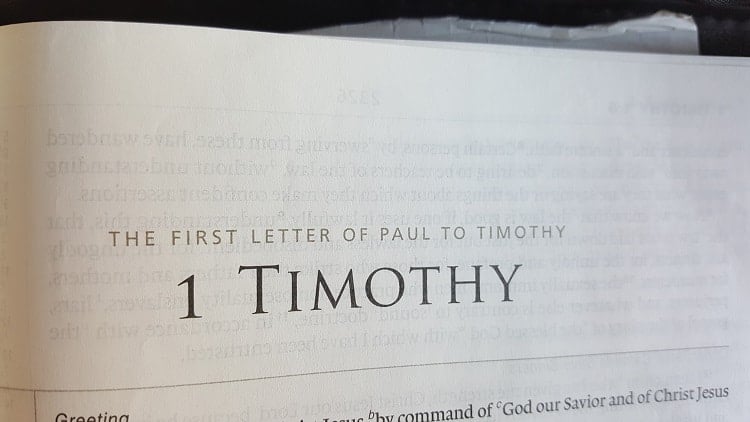⏱️ Estimated Reading Time: 7 min read
1 Timothy 1:1-11, “Paul, an apostle of Christ Jesus by command of God our Savior and of Christ Jesus our hope, to Timothy, my true child in the faith: Grace, mercy, and peace from God the Father and Christ Jesus our Lord. As I urged you when I was going to Macedonia, remain at Ephesus so that you may charge certain persons not to teach any different doctrine, nor to devote themselves to myths and endless genealogies, which promote speculations rather than the stewardship from God that is by faith. The aim of our charge is love that issues from a pure heart and a good conscience and a sincere faith. Certain persons, by swerving from these, have wandered away into vain discussion, desiring to be teachers of the law, without understanding either what they are saying or the things about which they make confident assertions. Now we know that the law is good, if one uses it lawfully, understanding this, that the law is not laid down for the just but for the lawless and disobedient, for the ungodly and sinners, for the unholy and profane, for those who strike their fathers and mothers, for murderers, the sexually immoral, men who practice homosexuality, enslavers, liars, perjurers, and whatever else is contrary to sound doctrine, in accordance with the gospel of the glory of the blessed God with which I have been entrusted.”
Think about this. You are moving into a new house, and you begin to think about where you want to hang a couple of mirrors and all of your pictures. You think through it, and because I’m a guy…I ask my wife. Then, you grab the first piece; center it, level it, and now you are ready to drive the nail. You look around, and there is no hammer. So, you begin to look around for anything that can help you drive this nail. Finally, you find a sledgehammer, and you start to think about using it.
STOP! It would be oblivious and damaging for us to use a sledgehammer to drive a picture-hanging nail into the wall! Just so, it would be ignorant to use the Torah as an endless source of speculations. That is exactly what Paul was writing about as the false teachers in the church were doing just this. Paul comes in and sets the record straight; the Law was not given for that purpose. Rather, it has a different, lawful use in the church and the world (v. 8).
Today’s Scriptural text uncovers one way the Mosaic Law is to be used correctly. Paul says the Law was not given for just people but for the ungodly (vv. 9–10). This is the use of the Law to oppose rebelliousness. It is not to be used, Paul is essentially saying here, for hollow speculations.
The Law Confronts Sin
One thing that we must note in this text is that the sin described in these verses is broadly parallel to the sins that are prohibited in the latter portion of the Ten Commandments. Commandments 5-10 deal with the treatment of one’s neighbor (Ex. 20: 12-17). And while we look through this list of sins in verses 9-10, we see that we can connect the dots between the two. Admittedly, the list in our text is not exhaustive, but it is a representative sample of the evil that was running rampant in the church. Therefore, Paul proclaims that the Law was “laid down” to confront those who explicitly violate its commands as well as to caution them against their sinful actions that are causing discord among the body of Christ.
When we study this section of text, we must understand that Paul’s statement that the “Law is not for just people” (v. 9) is not an absolute statement. He only means that the Law does not restrain Christians the same way it does non-Christians. Why is this? This is because believers have the Holy Spirit to keep us from evil (Rom. 8:9-10).
Do not get me wrong; the Spirit does speak through the Law to reveal our sin and lead us to repent (2 Kings 22). However, as one commentator puts it, the final effect does not produce fear of punishment, as it should in the hearts of a non-believer (Gen. 4:1–16). Instead, the Spirit uses the Law to form in us the desire to please the Lord in holiness.[1] God’s law, John Calvin continues to say, is not against us as it is for non-believers. Calvin writes the following, “It is not opposed to righteous persons, that is, to the godly and to those who willingly obey God.” [2]
In the church at Ephesus, these false teachers used the Law neither to deter sin nor to provoke repentance. To put it simply, they failed to focus on the Law’s opposition to ungodliness. Therefore, they kept the church from seeing its need for the life-giving gospel. Instead, they used God’s Law in a way God never intended.
Limitations on the Law
Like all tools in even the most seasoned contractor’s toolbox, the Law of Moses is limited in what it can do. Therefore, because the false teachers did not understand this vital truth, they misused the Law. Paul tells us elsewhere that the Mosaic Law can point people to Jesus (Gal. 3:24), but it cannot by itself give us the faith needed to grasp the Savior. The Law is also very useful as a guide to living a holy life, for believers can, by the power of the Holy Spirit, love others and thereby find joy in its commandments (Rom. 13:10). Nonetheless, because of its limitations, the Law is unable to show us each and every facet of obeying the Law perfectly; therefore, we must learn how to study the Law at the feet of Jesus to apply it rightly (Matt. 5:17–48).
The Law is Health Giving Doctrine
The Law of Moses condemns everything “contrary to sound doctrine” (1 Tim. 1:9–10). We should take just a moment to note that the phrase “sound doctrine” literally means in the original language it was written, which is Greek, “health-giving doctrine.” Therefore, we have proof in our selected text that there is a connection between sound theology and healthy living. But since the Law can only oppose those things that are against health-giving doctrine, the Law by itself cannot make us spiritually well.
Concluding Thoughts
Due to the way fallen men twist it, the Law must be seen through the light of the gospel. Furthermore, the gospel, through its application to us by Holy Spirit, gives us life (Rom. 16:25). Therefore, using the Mosaic Law as a tool to confront sin and to point to Jesus agrees with the gospel. The Law identifies sin, and the gospel is the solution to the problem of sin (1 Tim. 1:11). If the Mosaic Law is used for supposition or preached as a way to earn the Lord’s favor, it has not been rightly handled in light of the good news of God’s salvation.
Our own redemption, while a gift of the gospel, is not the final goal of the gospel. “The glory of the blessed God” is the ultimate end of the Good News of salvation.
Dr. John MacArthur explains, “The gospel reveals God’s glory, that is, the perfections of His person or attributes, including His holiness (hatred of sin) and justice (demand of punishment for violations of His Law) and grace (forgiveness of sin).” [3] Thanks be to God for this!
[1] John Calvin (1509-1564), Institutes of the Christian Religion, II.vii.6-12
[2] Ibid.
[3] The MacArthur Bible Commentary, p. 1, 778).




